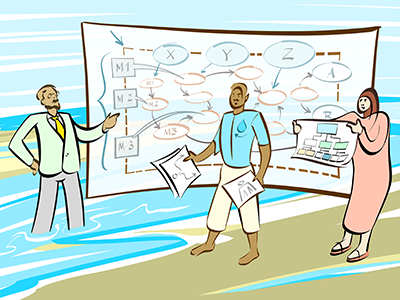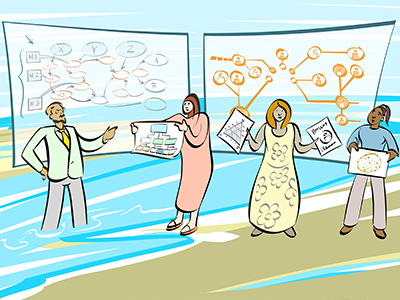Overview
Course video
Ensure the success of your plans by applying actor and strategy models to deliver effective action in stakeholder networks.
How do you deliver results in multi-stakeholder partnerships? How do you navigate through a political minefield? How do you make best use of your network?
This online course will equip you with a toolkit to enable informed decisions and smarter actions in dealing with others.
Through a clearer understanding of the network environment in which you operate, you will be able to design more effective strategies for dealing with the multiple stakeholders who are crucial to your organization's success. The result will be a significant reduction in the risk of delays, of cost overruns and failures, which will allow you to reap benefits from strategic partnerships.
The actor and strategy models that are taught in this course, enable you to assess the key issues at stake, and to develop strategic scenarios to anticipate opportunities and challenges in your stakeholder environment. They allow you to determine what network linkages are missing or need strengthening, to identify arguments that might convince others, and to think about credible threats and promises as part of a negotiation strategy.
You will apply a mix of tools and models to real-world problems, including your own case. Models covered are social network analysis, comparative cognitive mapping, cooperative and non-cooperative game theory. Feedback and advice will be provided by course instructors.
Practical applications
Models to predict plausible outcomes
Large cities need to expand, upgrade or rehabilitate their water and sewerage services. Privatization and public-private partnerships have been used worldwide resulting in both major successes and serious failures. The water privatization in Metro Manila in the Philippines, for instance, shows how two completely different outcomes can occur in the same case: one concessionaire operating successfully and another one filing for bankruptcy.
A game theory model can show that urban water privatization models typically have two plausible outcomes: the best possible one under optimal conditions, but also the worst in less-than-optimal conditions. Whilst private parties are often expected to operate more efficiently and contribute to the newest technologies and innovations, if those eager concessionaires overestimate their own capacities, huge failures will result. A few smart actions and conditions might help fix the incentives for prospective concessionaires and can make a world of difference.
Similar (actor) models applied to cases such as nature-based solutions for flood management, show that when the engineering potential seems highest, the collaboration – and therefore successful implementation – is in fact least likely to occur. With these insights, realistic strategies can be designed, instead of strategies based on naïve and wishful thinking.
After taking this course, you will be able to:
- Explain and anticipate actor strategies in complex environments based on a coherent conceptual framework
- Apply different actor and strategy models to sharpen your understanding of multi-stakeholder environments
- Develop strategies that increase the chances of success in building winning coalitions and effective partnerships.
Stories from Learners
"I notice that most people don't look beyond plan A. They seem to start with their plan A and then simply see what happens, but thinking through possible scenarios and developing back-up plans can really help to ensure you don't lose the momentum. This online course is an attractive way to learn about methods to better prepare your multi-stakeholder strategies." - Kirsten van Zalinge, Contract Manager at BAM Bouw & Techniek, formerly at Rijkswaterstaat, the Netherlands.
"Since following the course, I've had the opportunity to apply the models I've learned several times. Each model is a tool to analyze actor networks from different perspectives, each providing complementary insights. As such, the course is useful to any professional looking not only to better understand complex actor problems, but also to present them in a structured way." - Joao Gorenstein-Dedecca, Sustainable Energy Technologies and Strategies Researcher at IIT Comillas Madrid and TU Delft.
Details
Is this course for you?
This course is aimed at policy advisors, strategic planning professionals, project managers, community managers, and others working in complex multi-actor environments.
If you work in these fields, you know that dealing effectively with other stakeholders requires not just soft-skills but also sound preparation and a proactive strategy.
If stakeholders are really critical for success, you need analytical tools that provide greater insights. In this course, you will learn hands-on methods and use dedicated software packages that will enable you to perform a focused, practical analysis of strategic stakeholder environments.
Software
In this course you will use the following software: Gambit, R and Gephi.
Course Syllabus:
Topic 1: Introduction
- Introduction to the course and the participants.
- Opportunity to refresh basic knowledge of stakeholder mapping techniques (optional).
Topic 2: Framework
Conceptual framework for strategic actor interactions
- Key concepts to explain strategic actor behaviour
- Overview of actor models to sharpen your understanding of your actor environment
- Reflection on usefulness of actor models for design of effective strategies
Topics 3 and 4: Models
Participants select two modelling approaches, out of a total of four available modules:
- Social network analysis (structure of networks and managing relations)
- Comparative cognitive mapping (perceptions and building winning arguments.
- Non-cooperative game theory (conflict analysis and shaping the space of probable outcomes)
- Cooperative game theory (coalition analysis and sharing rewards of cooperation)
Each module will cover the same elements:
- When and why to use this modelling approach
- Basic analytical concepts used in the model
- Stepwise approach to applying the model
- Application of the model to a real-world problem, and implications for action
Course participants are required to cover at least two models and can cover more if they wish. The real-world problem used in Topics 3 and 4 will be the same for each model. It concerns the issue of nature-based flood defenses in the Netherlands, using footage and interviews with real actors, involved in the "BE SAFE" research project, a collaboration between TU Delft, NIOZ, University of Twente, Deltares, HKV, Rijkwaterstaat, Staatsbosbeheer, Ecoshape, Boskalis, Van Oord, World Wildlife Fund, Natuurmonumenten, It Fryske Gea and HZ University of Applied Sciences.
Topic 5: Modelling your own case
Course participants can work individually on a case of their own. They can also work in small groups if they prefer and are willing to share insights into the environments from one of the participants. They will apply one the previous models to analyze their case and formulate a strategy.
- Identification of case topic and associated modelling approach. Concise work plan (using a preformatted sheet) and feedback
- Model construction and analysis
- Thinking through scenarios and strategies
- Feedback from course teachers
Feedback and advice will be provided by course instructors on the case topic and work plan early in the weeks dedicated to this topic, on constructed models and initial analysis in the middle of the period for this topic, and on the implications for action towards the end, in the pre-final course week. Some flexibility is possible in the execution of this project, which can also be finalized early in the final week of the course if participants so desire.
Next steps – non-mandatory debriefing, reflection and final discussion between participants and instructors.
Qualifications
Certificates
If you successfully complete this course you will earn a professional education certificate and you are eligible to receive 5.0 Continuing Education Units (5.0 CEUs).
Chartered Engineering Competences
All our online courses and programs have been matched to the competences determined by KIVI’s Competence Structure, a common frame of reference for everyone, across all disciplines, levels and roles.
These competences apply to this course:
- A1: Extend your theoretical knowledge of new and advancing technologies.
- C1: Plan for effective project implementation.
- D1: Identify all stakeholders and communicate with others at all levels.
Admission
This course is primarily geared towards working professionals.
Prerequisites:
None. Experience in working with stakeholder networks is a plus. Graduate level course (MSc and post-MSc)
Contact
If you have any questions about this course or the TU Delft online learning environment, please visit our Help & Support page.




